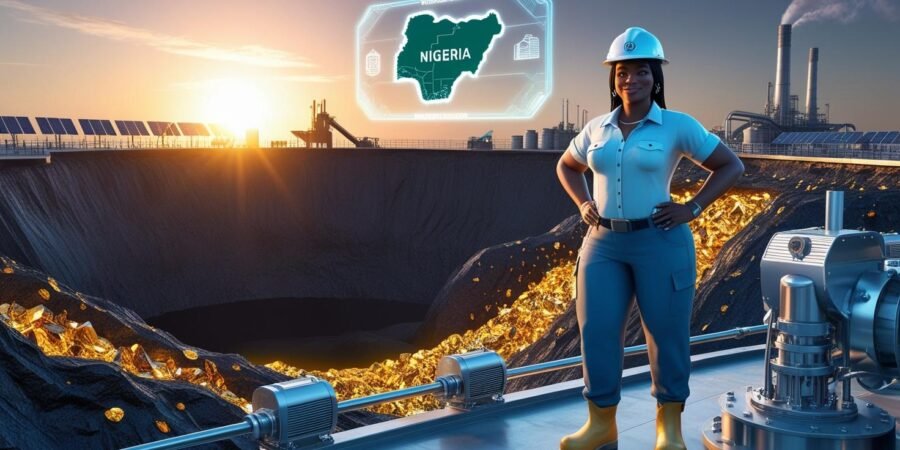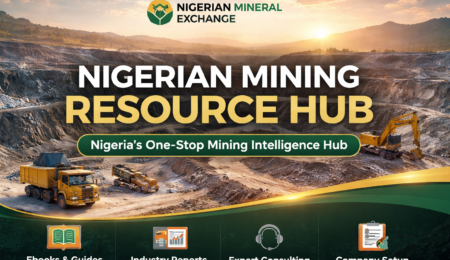For over five decades, oil has dominated Nigeria’s economic landscape. But beneath the noise of crude exports lies a quiet revolution — one that promises to redefine Nigeria’s future wealth. That revolution is solid minerals.
With the rising global demand for strategic and industrial minerals, Nigeria is sitting on a goldmine — literally and figuratively. The shift is no longer theoretical. The evidence is mounting: solid minerals could rival — or even surpass — oil in value within the next decade. If Nigeria gets it right, this sector could become the heartbeat of the nation’s new economy.
Nigeria’s Mineral Wealth Is Vast — and Still Mostly Untapped
Nigeria boasts over 44 commercially viable solid minerals, scattered across every state of the federation. From gold in Zamfara, lithium in Nasarawa, to rare earths in Plateau, the country is a geological marvel yet to be fully explored. For detailed guidance on where gold is found in Nigeria, our ebook, Finding Gold in Nigeria: A Practical Guide for Landowners, Investors, and Prospectors, is an essential resource.
These minerals aren’t just valuable in isolation — they are the raw materials that power every industrialized economy. Cement, steel, glass, batteries, electronics, tiles, fertilizers, pharmaceuticals — the list is endless. The Nigerian solid minerals sector can supply not only export markets but also fuel local industrialization, creating jobs, driving manufacturing, and reducing import dependency.
The Government Is Finally Listening — and Acting
The current administration has made bold statements, but more importantly, bold moves. Under President Bola Ahmed Tinubu’s leadership, and with the Ministry of Solid Minerals Development receiving renewed attention, the sector is now central to the national diversification agenda.
Key reforms include:
- Strategic roadmap for developing priority minerals
- Digitization of cadastre and licensing
- New push for local value addition and processing
- National policies to attract private capital and foreign direct investment
- Growing coordination with state governments and host communities
This is not business as usual. The government is actively working to turn mineral deposits into economic development.
Global Demand Is Rising — and Nigeria Has What the World Needs
As the world races toward clean energy, electric vehicles, and smart technologies, critical minerals like lithium, cobalt, and rare earths have become the new oil. Countries across Europe, Asia, and North America are scrambling to secure reliable sources outside dominant players like China and the DRC.
Nigeria, with its strategic reserves and democratic stability, is emerging as an attractive alternative. The global mineral supply chain is being restructured, and Nigeria stands to win big — if it acts fast.
Support Services Are Booming — and They’re Mind-Blowing
What most people don’t realize is that mining isn’t just about digging rocks. It’s about the entire value chain — and that chain is massive.
From:
- Surveying and geoscience services
- Equipment leasing, logistics, and haulage
- Explosives and drilling companies
- Mineral testing labs and processing plants
- Legal, environmental, and community relations services
- Technology providers, GIS and remote sensing services
The mining sector is a massive ecosystem of jobs, innovation, and entrepreneurship. If oil builds pipelines, mining builds nations — from roads to railways, from small workshops to giant factories.
The Nigerian Mineral Exchange: Digital Catalyst for a New Era
Enter the Nigerian Mineral Exchange (NME) — a cutting-edge technology and e-commerce platform developed by African Trade and Commerce Development Company Ltd (ATCDC). NME is Nigeria’s first dedicated online marketplace designed to connect the entire mining ecosystem, serving as a hub for miners, equipment manufacturers, machinery and tool suppliers, technology providers, mining service companies, professionals, and investors.
In a sector historically plagued by opacity and fragmentation, NME brings transparency, speed, and global visibility. It is a symbol of what the future of Nigerian mining looks like — smart, digital, and investment-ready.
Diversification: Not Just a Buzzword Anymore
For too long, “economic diversification” was little more than lip service. But now, it’s real. With the right reforms, investments, and digital enablers like NME, solid minerals can provide a sustainable non-oil revenue stream, helping Nigeria build resilience in the face of global oil volatility.
Mining could:
- Replace lost oil revenues
- Power the local manufacturing sector
- Drive rural development
- Attract billions in FDI
- Create millions of direct and indirect jobs
This is true diversification — not just shifting focus, but building a parallel economic engine.
Of Course, Challenges Remain — But They’re Surmountable
Security in some regions, illegal mining, underdeveloped infrastructure, lack of processing capacity — these are real issues. But with public-private collaboration, modern technologies, and strong governance, none of them are beyond reach.
A Greener, More Responsible Future
In all this, one principle must be non-negotiable: environmental and social sustainability.
The mining revolution must not destroy what it seeks to uplift. ATCDC and the NME platform are committed to championing the balancing of economic development with environmental protection and community well-being.
It’s not just about extracting minerals — it’s about building legacies.
Conclusion: Nigeria’s Moment Is Now
Oil may have built Nigeria’s past, but solid minerals will shape its future. The country is sitting on enormous, underutilized wealth, and with visionary leadership, digital platforms like NME, and a renewed push for sustainability and investment, Nigeria could become a global mineral powerhouse within the next decade.
The world is watching. The market is waiting.
Will Nigeria lead or lag?
READ Also:
The Ultimate Guide to Starting a Mining Company in Nigeria
Need a Mining License or Mineral Trade Permit in Nigeria? Here’s How We Can Help





Leave a Reply